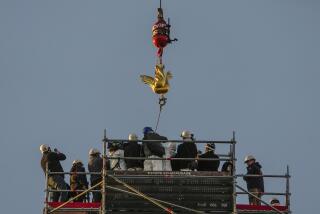Coalition Faulted for Lax Controls
The top investigator for the Coalition Provisional Authority, which was created to run the occupation of Iraq, released three audits Tuesday criticizing the U.S.-led agency’s financial and management controls.
Stuart Bowen, the CPA’s inspector general, found that the agency failed to exercise adequate control over $9 billion in international aid and a hotel contract in Kuwait to house government employees.
The audits are the first official accounting of what has long been rumored to be a chaotic and haphazard system of overseeing billions of U.S. taxpayer dollars. The audits were made public a day after the official termination of the CPA, which transferred authority over Iraq to an interim government Monday.
In the most damning report, Bowen found that the CPA failed to rein in the cost of housing government employees at a hotel in Kuwait under a contract with Halliburton Co. The report said the CPA had allowed unauthorized personnel to stay at a Hilton in Kuwait City that was supposed to be used only by senior officials working for the CPA.
All told, Halliburton, which managed the contract to house government employees and contractors at the hotel, charged $2.85 million for the rooms. The employees could have stayed in tents or other hotel facilities with lower rates, the audit found.
In one case, a senior CPA official set up living and working quarters in a hotel room for the equivalent of nearly $700 a night. In another case, the CPA allowed Halliburton to rent hotel facilities for medical checkups and other services at a cost of $342,000 per year.
The company also charged $191,000 a year for laundry services. The CPA has since placed washers and dryers in cheaper, multi-person rental villas that are part of the hotel complex.
The report is likely to fuel further attacks by Democrats against Halliburton, which Vice President Dick Cheney ran from 1995 to 2000 and which is being investigated in connection with its activities in Iraq. But audit officials said the focus was on CPA failures to control costs under the contract, not on possible abuse of the process by Halliburton.
“This is a CPA oversight issue,” said Jim Mitchell, a spokesman for the CPA’s inspector general. “We didn’t audit the contract as such.”
Two other audits also found problems at the CPA, which was created last summer to replace the Office of Reconstruction and Humanitarian Assistance in overseeing Iraq.
In one case, the auditors found that the CPA had trouble filling jobs and keeping track of the number of employees working at the agency.
Although the agency had more than 2,100 slots available, only about 1,200 people were employed -- and CPA officials acknowledged that the number could be off by as many as 100 people because there was no system of tracking employment.
The report mirrors the concerns of some U.S. officials assigned to work in Iraq who have repeatedly complained about the difficulty of attracting people to work in the war-torn country. In many cases, top jobs were filled by retirees or recent college graduates.
One audit found problems with CPA planning for the use of $9 billion in pledged international aid in addition to $18.4 billion in U.S. funds. The CPA failed to coordinate spending to prevent potential duplication of projects, according to the report. Although it cited no examples, the report said the lack of documentation could impair efforts to raise money for Iraq.
More to Read
Start your day right
Sign up for Essential California for news, features and recommendations from the L.A. Times and beyond in your inbox six days a week.
You may occasionally receive promotional content from the Los Angeles Times.






